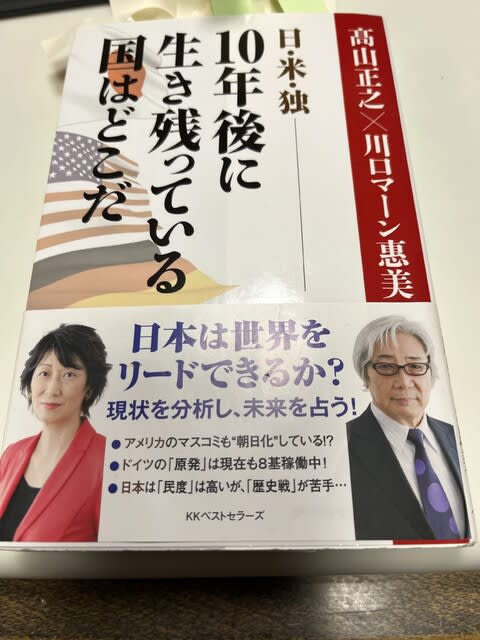The following is from a book titled "Japan, the U.S., and Germany: Which Country Will Survive 10 Years from Now?
The following is from p. 154, "The root of all evil is still the Asahi Shimbun.
Takayama
There is also a problem with their reporting on the "Constitution."
The Asahi Shimbun is actively talking about a constitutional theory that uses the character of "constitution" to " correct a mistake."
So-called "constitutionalism" is also used in that sense.
In the case of Japan, however, the "Seventeen-Article Constitution" was already established in the time of Prince Shotoku.
The essence of this Constitution is "Harmony is the most important thing."
Therefore, in the case of Japan, "Constitution" can be replaced by "harmony."
Such intentional perversion is rampant in Japanese journalism today.
Mr. Ruhi Abiru of Sankei Shimbun recently published a book describing an episode in which Soichiro Tahara boasted, "I have taken the heads of three prime ministers."
Put another way, no one is more powerless than the Prime Minister.
As I can see, Japanese journalism has made a big mistake.
They think that the role of newspapers is to annoy the government by criticizing government policies and to get the prime minister and his cabinet members fired.
Kawaguchi.
Speaking of which, I once had a chat with an editor.
He said that he thought the Japanese media had the mistaken impression that they were the ones who were supposed to speak out against the ruling party.
Since the opposition party is not solid, they think they are taking the place of the opposition party.
That is fine, but there is too much damage if the national interest is secondary and all they do is criticize the government.
Takayama.
And it is the Asahi Shimbun that always holds the key.
One of the points of contention is that in Japan, for example, the government in the Edo period is easy to understand.
The machi-bugyō looked after all the court judges, lawyers, and prosecutors.
Carl Peter Thunberg from Sweden was surprised at that time.
A single yoriki was in charge of the judge, the magistrate, and the prosecutor, and the people being judged were satisfied with the extenuating circumstances.
That is not precisely noblesse oblige, but in Japan, those in positions of authority have a certain degree of awareness of their role as leaders.
It is like, "Better go to bed supperless than rise in debt."
However, the Asahi Shimbun has been saying, "The way of democracy is two major parties," as if it were a "one-party dictatorship of the Liberal Democratic Party.
However, the majority of the Japanese people, just like the ruling power in the past, can be balanced by being even-handed and having some variation among the parties.
The Asahi Shimbun does not understand this.
A fool's one bit of knowledge and repeats, "The democratic parliament is two major parties".
Kawaguchi.
The Asahi Shimbun has a habit of looking down on people, thinking that they represent the intelligentsia and that they are producing a newspaper for the intelligentsia.
Takayama
At one time, the Asahi Shimbun advocated a "two-party system" and used the Socialist Party as a pawn.
However, the people who came out of the Socialist Party, such as Takako Doi, Tomiichi Murayama, and now Mizuho Fukushima, were all second-rate or lower.
That is why the Socialist Party fell apart in the air, and the politics of the Socialist Party was not at all what it should have been.
And when the Socialist Party failed, the Asahi Shimbun took over the Democratic Party of Japan.
Kawaguchi
Hatoyama, Kan, and Noda failed three generations in a row.
Even though they succeeded in seizing power, they still needed to be able to manage it.
It also requires cultivated foreign relations and nurtured intuition over the years.
The DPJ had none of these.
I am sure they were surprised to find that the media, which they had thought was on their side, suddenly attacked them when they became the ruling party.
However, the Japanese media attacked the administration, as they had previously done.
It was not because they loved the DPJ that they had not attacked it before.
In Germany, both the CDU and the SPD are now in decline, and several small parties exist, but the country has had a two-party system since the end of World War II.
In that sense, the CDU and the SPD could run a government.
However, if I may add a word, the two-party system is lossy.
Every time there is a change of government, the policy changes.
It can be clearly seen in American politics.
Takayama.
The Asahi Shimbun's attempt to restore the two-party system and have the DPP join forces with the Communist Party will be the last of such moves.
The Socialist Party didn't work, the Democratic Party of Japan didn't, and yet they keep saying that the next step will be a "Democratic-Communist Coalition.
They are doing this because they think the masses are stupid enough to be fooled twice or thrice, and it is easy to print any lie.
Kawaguchi.
It bothers us when the Asahi Shimbun and TV agitate the public without regard to the national interest.
I was surprised when a prominent cultural figure once wrote in a column in a particular magazine, "It is not classy to put the national interest at the forefront."
It is connected to the fact that Japan does not belong only to the Japanese people.
But what is the purpose of politics if not the national interest?
As former British Prime Minister Palmerston said, "A nation has neither eternal friends nor eternal enemies. There is only eternal national interest."
International goodwill and cultural exchange should be left to those in other fields, and politicians should pursue the national interest.
This article continues.




















